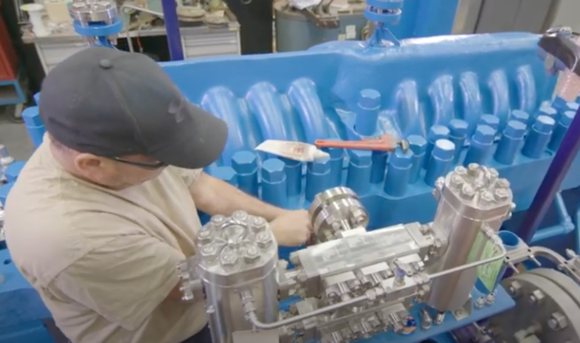Two reinsurers that shared part of the risk on a $25 million umbrella policy issued to a New York manufacturer nearly five decades ago are not liable for defense costs in addition to the policy limits, the 2nd Circuit Court of Appeals ruled Thursday.
What’s more, one of the reinsurers is entitled to a new trial to settle the question of whether it is a valid successor to the insurance contract, the appellate panel ruled.
The decision affirmed a ruling by U.S. District Brenda K. Sannes and reversed a jury decision and jury instructions issued by U.S. District Judge David N. Hurd.
Both Northern District of New York judges had reached opposite conclusions on the same issue — whether Munich Reinsurance America and Century Indemnity Co. are required under New York law to reimburse Utica Mutual Insurance Co. for the cost of defending asbestos claims against its policyholder Goulds Pumps Inc. in addition to the limits on their 1973 facultative certificates.
“We hold that the 1973 certificates reinsure defense costs within limits, not in addition,” the 3-0 panel decision says.
Gary L. Wickert, a national subrogation expert who writes a column on the subject for the Claims Journal, said claims professionals should be pleased that the court decided a 2007 settlement agreement between Utica and Goulds does not independently require Century or Munich to pay defense costs in addition to limits.
“This is good, in so far as underwriters and claims professionals alike can look to the policies and feel confident that the extent of their exposure is set forth therein,” he said in an email. “What is interesting, however, in that the holding appears to wag its finger at those who would try to expand coverage in a reinsurance agreement/facultative certificate beyond what is covered in underlying policies.”
Goulds Pumps, which traces its roots to an 1848 investment by dry goods merchant Seabury S. Goulds in a Seneca Falls, N.Y. pump factory, purchased insurance from Utica Mutual Insurance Co. from 1955 to 1986. The 1973 insurance package included an umbrella policy with an aggregate limit of $25 million.
In the 1990s, Goulds contended with a wave of asbestos litigation that lasted until the 2000s. Utica defended the lawsuits as required by the policies it issued to the manufacturer.
In 2007, Utica settled coverage disputes with Goulds and turned to Munich Re and Century to pay their undisputed one-fifth shares of the umbrella policy. Munich Re and Century each paid $5 million.
But Utica billed the reinsurers $2,760,534, arguing that the insurance certificates required them to pay defense costs in addition to the policy limits because of an endorsement added to the policy in 1974.
Alternatively, the insurer argued that the settlement it had reached with the plaintiffs required the reinsurers to reimburse its defense costs under a theory known as the “follow-the-settlements” doctrine. Utica argued that its settlement with Goulds requires the reinsurers to pay the billed defense costs, and that the reinsurers did not try to reopen the settlement after the endorsement was discovered.
The 2nd Circuit disagreed. The panel said it agreed with Judge Sannes that the endorsement “unambiguously does not apply to the excess coverage.” The opinion says the endorsement in the umbrella policy applied only to occurrences not covered by the $300,000 primary injury for bodily injury claims. Asbestos injuries are clearly bodily injuries, the panel said.
Having decided that the reinsurers weren’t obligated to pay defense costs in excess of the policy limits, the appellate panel reversed the jury verdict that was reached after a trial presided over by Judge Hurd.
The panel also ordered the trial court to hold a new trial to decide whether Century is actually the successor to the original reinsurance contracts written in the 1970s.
Century agrees that it is the successor to policies written by the Insurance Co. North America, which Utica alleges is the successor. But Century says the facultative certificate was actually issued by INA Reinsurance Co., a separate entity.
“The similarity of names is an unfortunate, confounding fact,” the opinion says.
The 2nd Circuit panel said in the opinion that Hurd abused his discretion when he refused to allow Century to enter into evidence documents that it said showed that INA Reinsurance, not INA, had issued the certificate.
The opinion says Century is also entitled to a new jury trial on its claim that Utica acted in bad faith by billing it for defense costs beyond the policy limits. The panel said Hurd improperly instructed the jury that there was a question of whether Century had met its obligations under the contract, when actually there is no valid dispute about that fact.
“As a matter of law, Century is not obligated under the certificate to pay defense in addition to limits–the only pertinent issue at trial regarding Century’s obligations,” the opinion says.
About the photo: Photo taken from a Goulds Pumps promotional video.
Was this article valuable?
Here are more articles you may enjoy.


 ‘Structural Shift’ Occurring in California Surplus Lines
‘Structural Shift’ Occurring in California Surplus Lines  Bayer to Make $10.5 Billion Push to Settle Roundup Cases
Bayer to Make $10.5 Billion Push to Settle Roundup Cases  Red Flags Adjusters Should Look for in Truck Accident Claims Investigations
Red Flags Adjusters Should Look for in Truck Accident Claims Investigations  When the Workplace Is Everywhere: The New Reality of Workers’ Comp Claims
When the Workplace Is Everywhere: The New Reality of Workers’ Comp Claims 